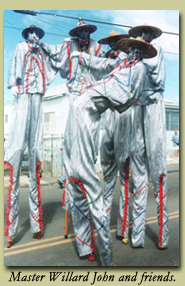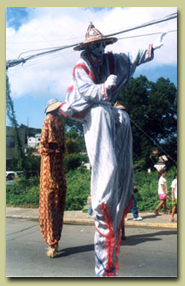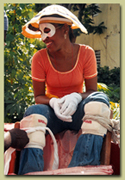Culture: Portrait of Our Soul
Mocko Jumbies
Mocko Jumbies
 From the womb of our Motherland comes an ancient stilt-walking tradition that refuses to die. And thanks to the tenacity and vision of practitioners like Willard John (pictured), perhaps this art form never will. We call these towering souls Mocko Jumbies. Without them, carnival would not be the same. And the spirits of our ancestors would not know peace.
From the womb of our Motherland comes an ancient stilt-walking tradition that refuses to die. And thanks to the tenacity and vision of practitioners like Willard John (pictured), perhaps this art form never will. We call these towering souls Mocko Jumbies. Without them, carnival would not be the same. And the spirits of our ancestors would not know peace.
Kofi Boateng, a native of Accra, Ghana who now lives in the Virgin Islands, once told me that this tradition “is as old as the African people themselves.” Boateng’s tribe, the Ashantis, call these daring stilt walkers “kaka motobis” which, he said, depict ancestors who have returned to life.”
Luz James, the current lieutenant governor of the Virgin Islands, has been practicing this art form for years. “It’s a hell of a feeling,” he once told me, when I worked as a writer for the Daily News. “No one can really tell you about it. You’re within your own domain.”
 “Although stilt masquerades historically appeared in many places in the Caribbean, they have come to be particularly associated with the Virgin Islands,” says Robert Nichols, author of Old Time Masquerading in the U.S. Virgin Islands. And Virgin Islands folklore, adds Nichols, “ascribes a mocko jumbie with the ability to interact with spirits –attracting good ones and dispelling bad ones.”
“Although stilt masquerades historically appeared in many places in the Caribbean, they have come to be particularly associated with the Virgin Islands,” says Robert Nichols, author of Old Time Masquerading in the U.S. Virgin Islands. And Virgin Islands folklore, adds Nichols, “ascribes a mocko jumbie with the ability to interact with spirits –attracting good ones and dispelling bad ones.”
Nichols has done extensive research on masquerading in Africa, the Caribbean and Europe. He says evidence suggests the mocko jumbie tradition had “formative influences from the Mandinka, Mende, or related ethnic groups from the the Upper Guinea region of West Africa.”
 Ask Virgin Islanders what the term mocko jumbie means and you’ll get different answers. The word, mocko, according to Nichols, “can be interpreted in at least four ways: a spirit, a mocker, a sorcerer, and as belonging to the Mocko ethnic group” (of Nigeria, West Africa). Jumbie refers to spirit.
Ask Virgin Islanders what the term mocko jumbie means and you’ll get different answers. The word, mocko, according to Nichols, “can be interpreted in at least four ways: a spirit, a mocker, a sorcerer, and as belonging to the Mocko ethnic group” (of Nigeria, West Africa). Jumbie refers to spirit.
Among the many interesting interpretations, writes Nichols, is one that was made by Dr. Hollis “Chalkdust” Liverpool, a well-known Calypsonian and ethnomusicologist. “Chalkdust conceptualizes the mocko jumbie as a diviner who oversees the village, metaphorically, he is so tall he can see what is happening both in the present and the future.”